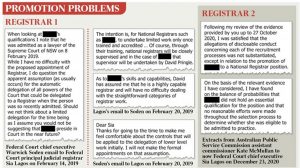Untried junior lawyers score key Federal Court positions
Sia Lagos, former principal judicial registrar for the Federal Court of Australia
- EXCLUSIVE
BUSINESS EDITOR
LEGAL AFFAIRS CORRESPONDENT
- The Australian
- 2:18PM FEBRUARY 8, 2022
At least two untried and underqualified junior lawyers were given high-paid, senior positions at the Federal Court ahead of better qualified candidates.
One employee was promoted to the position of national registrar in December 2016 despite not having been admitted as a practitioner in any state.
A confidential Australian Public Service Commission investigation into the matter later found that the woman “did not hold an essential qualification for the position and no reasonable efforts were made throughout the selection process to determine whether she was eligible to be admitted to practice”.
In a second instance, a legal case manager had yet to complete his College of Law legal training when offered a position as national registrar in September 2018 – over other experienced solicitors – months before he completed his course.
Documents obtained by The Australian show the court’s then chief executive, Warwick Soden, was so alarmed by the appointment that he wrote to the then principal judicial registrar, Sia Lagos, to ask: “Should we not think about a limited delegation for the time being as I assume you would not be suggesting (he) preside in court in the near future?”
The selection report obtained by The Australian said: “(His) referees both spoke of the quality of work that (he) produces; and how he is always positive and is a delight to work for.” “(He) was one of the lead applicants.”
Andrea Jarratt, the director of national operations, wrote in an email sent in November that the man, who had only graduated university the previous year, would “not be undertaking … delegated judicial work until he is admitted to practice”. He was admitted in February 2019.
The Australian has chosen not to publish the names of the two employees. Both still work at the Federal Court.
Descriptions for the national registrar positions read: “This position may require the occupant to perform statutory legal functions, as necessary. Therefore, legal qualifications and admission as a practitioner of the High Court and/or the Supreme Court of a State or Territory of Australia is essential. “To undertake this role, the successful candidate must have … litigation and case management experience in superior courts of Australia.”
The Federal Court’s registrars – some of whom are paid more than $140,000 a year – have the power to make orders about discovery, inspection and production of documents, and make orders about costs.
New & improved business newsletter. Get the edge with AM and PM briefings, plus breaking news alerts in your inbox.
Sign up
They can also exercise various powers delegated by judges to make decisions under the Bankruptcy Act, the Corporations Act and the Native Title Act.
The Australian has obtained applications for the national registrar positions including one lawyer who had been a litigator since 1994 specialising in Federal Court matters. She had previously been a deputy district registrar with the court, lectured at the University of NSW and had published several books about Federal Court litigation. The appointment caused some disquiet within the court.
One email from then deputy principal registrar John Mathieson, sent on February 13, reads: “There is no mention in (his) CV that he has been admitted in the Supreme Court as a legal practitioner. You will remember from our earlier general discussions about appointments that admission was a mandatory requirement for appointment.”
Ms Jarratt responded: “(He) was admitted last Friday.” Mr Soden, the following day, wrote to Ms Lagos: “While I have no difficulty with the proposed appointment of registrar, I do question the apparent assumption (as usually occurs) for the automated delegation of all powers of the court that could be delegated to a registrar when the person was so recently admitted.”
“David (Pringle) has assured me that he is a highly capable registrar and will have no difficulty dealing with the straightforward categories of registrar work,” Ms Lagos wrote on February 20. “You will note from (his) CV that he also comes with considerable initial training in mediation, and we have no doubt that once accredited, he will skilfully conduct less complex mediation as needed.”
The Australian is not suggesting either employee has been unable to perform in their roles, only that the appointment process caused concerns within the court.
The appointments of the two employees were also the subject of an APSC investigation by acting assistant commissioner Kate McMullan. In late December 2020, Ms McMullan wrote to Ms Lagos to inform her she had found the recruitment process that led to the court promoting the woman had breached the Public Service Act because “all eligible members of the community were not given a reasonable opportunity to apply to perform the relevant duties”.
“(This is) because … if admission as a legal practitioner was not essential for performance of the role, listing it as an essential requirement in the advertisement may have precluded other members of the community with the same qualifications as (the woman) from applying for the position. Admission as a legal practitioner is listed as essential for performance of the role., but does not appear to have been considered as part of the selection process,” Ms McMullen wrote.
“(She) … was selected over a field of candidates all of whom did have this work-related quality.”
There was no breach in the case of the man, she wrote, because there was “a clear pathway to eligibility within a reasonable time after the recruitment process” and “it was reasonable to expect other members … who had an anticipated date for admission to legal practice in the very near future would have felt it was open to them to apply for the position.
“While I did not make any adverse findings concerning the engagement of (the man), as a matter of best practice it may have been advisable for the selection panel to more explicitly record the reason for shortlisting, interviewing and selecting such a candidate.”
The Federal Court declined to comment.
BUSINESS EDITOR
Kylar Loussikian is The Australian’s Business Editor. He has been recognised with a Walkley Award and was twice named the Higher Education Journalist of the Year at the National Press Club. Kylar was previously… Read more
LEGAL AFFAIRS CORRESPONDENT
Jill Rowbotham is an experienced journalist who has been a foreign correspondent as well as bureau chief in Perth and Sydney, opinion and media editor, deputy editor of The Weekend Australian Magazine and highe… Read more





